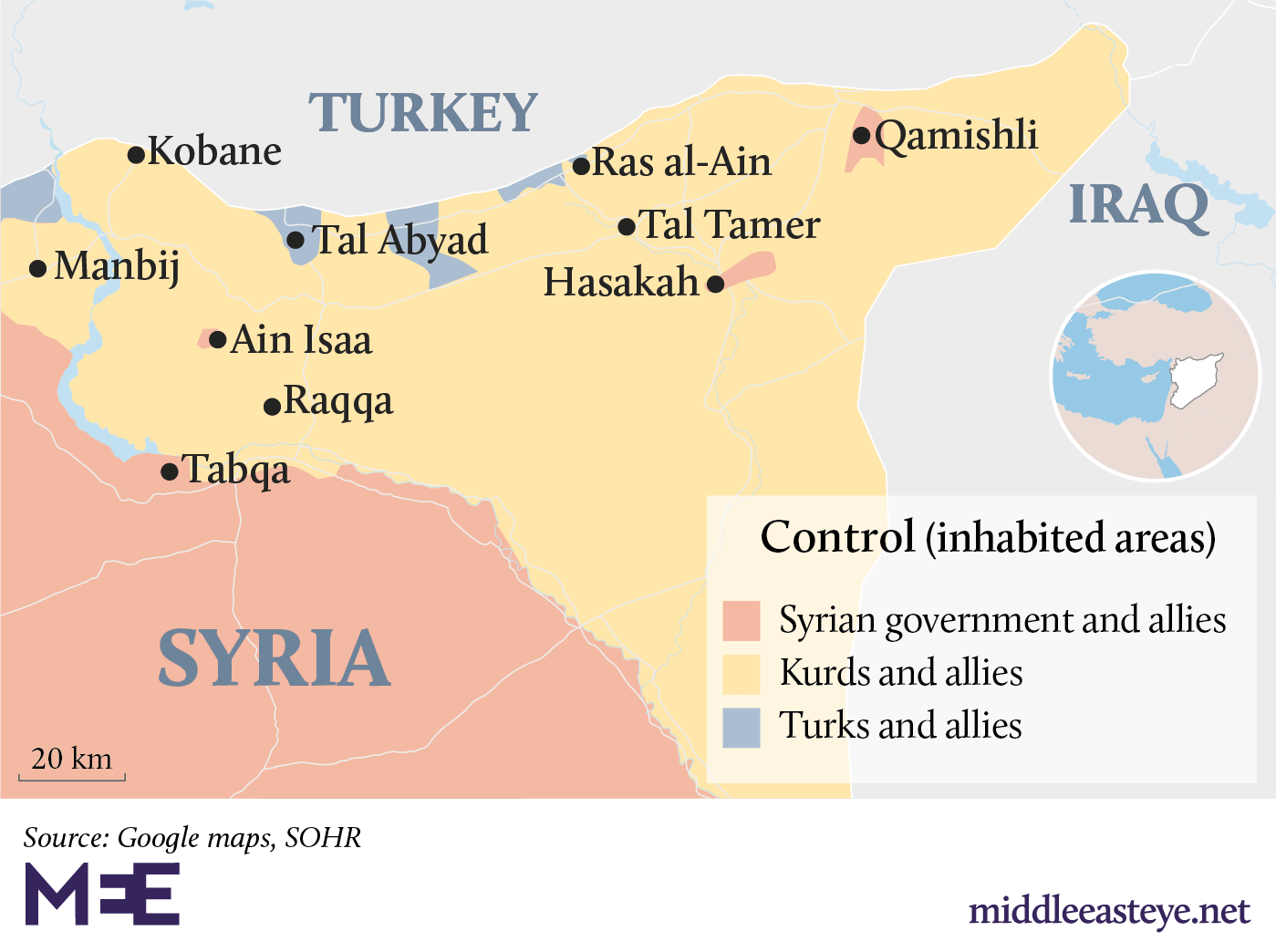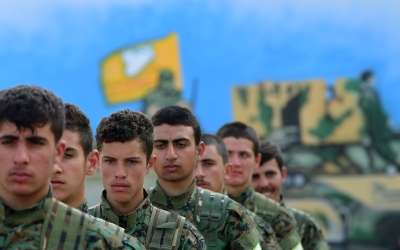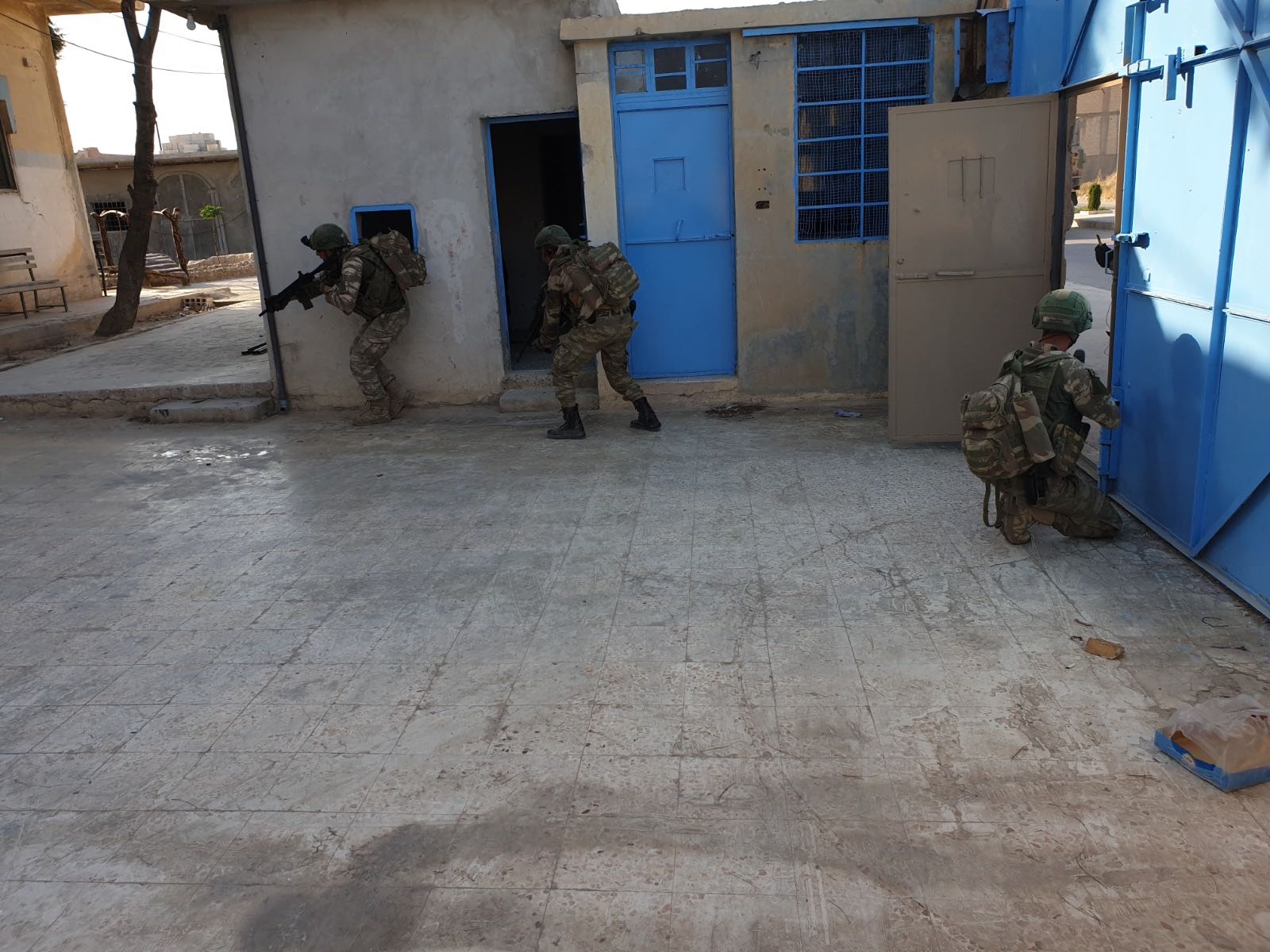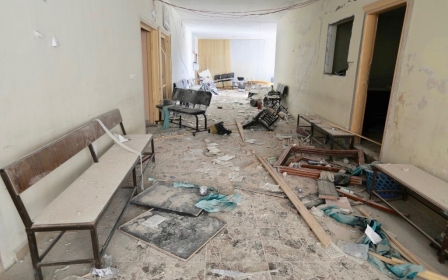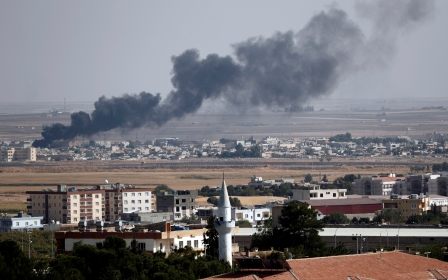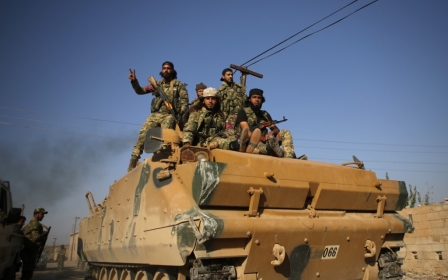Turkish and Syrian government forces face off over key northeastern cities

Syrian government soldiers were deployed in several areas of northeast Syria on Monday, putting them at loggerheads with Turkish forces, as they regained territory President Bashar al-Assad lost early in the eight-year war.
Buckling under a Turkish assault, Syrian Kurds agreed a day prior to allow Damascus into their autonomous enclave to help defend the towns and cities under their control.
Syrian state news agency SANA on Monday reported that Syrian government forces had entered Manbij, a strategic, Arab-majority city on the Syrian-Turkish border.
A local official in Manbij, which is controlled by a military council linked to the Kurdish administration, confirmed the report to AFP news agency, stating that troops had "entered and deployed on frontlines".
Both Turkish and pro-Damascus forces have been seeking to secure Manbij, with Turkey-backed forces reportedly massing on the western edges of the area.
New MEE newsletter: Jerusalem Dispatch
Sign up to get the latest insights and analysis on Israel-Palestine, alongside Turkey Unpacked and other MEE newsletters
'When Manbij is evacuated, we will not go in there as Turkey. Our Arab brothers, who are the real owners, the tribes... will return there'
- Turkish President Recep Tayyip Erdogan
Turkey's President Recep Tayyip Erdogan, who launched the offensive last week after his US counterpart Donald Trump agreed to withdraw American troops, said on Monday that he expected pro-Turkish forces to enter Manbij and Kobane soon.
"When Manbij is evacuated, we will not go in there as Turkey. Our Arab brothers, who are the real owners, the tribes... will return there. Our approach is to ensure their return and security there," he said.
Ankara has been shocked at the ease with which its troops, alongside its Syrian rebel proxies, have claimed victories around the key border towns of Ras al-Ain and Tal Abyad, Turkish officials told Middle East Eye. However, Damascus' capture of Manbij may soon pit Turkey directly against Syrian government forces.
Erdogan added that he expects Russia, which brokered the deal between the Kurds and Damascus, not to obstruct Turkish advances on Kobane, which is known as Ain al-Arab in Arabic.
"There is a lot of gossip now, but it seems... there won't be any problem in Kobane with Russia's positive approach as of now," Erdogan said.
However, newspapers affiliated with the Syrian government reported that the Kurds are expected to allow Damascus' forces into the cities.
"There is a cautious calm in Kobane, to a point it’s terrifying," Roj Mussa, a local journalist in the city, told MEE.
'There is a cautious calm in Kobane, to a point it’s terrifying'
- Roj Mussa, local journalist
"Residents have left the city, fearing Turkish bombing that could lead to massacres like those seen in other areas on the Turkish-Syrian border."
Though residents of Kobane expect Syrian government forces to enter soon, US troops are stationed on the Kara Cossack Bridge in Aleppo's eastern countryside that links the city to Manbij, according to Mussa.
"US forces are stationed there to stop the government from entering the city. The bridge is the only gateway between Manbij and Kobane," he said.
On Monday, Syrian state TV aired images of government troops, belonging to Brigade 93, entering Ain Issa, a town 35km from the Turkish border that has been out of Damascus' hands since 2013.
Syrian government forces have also been deployed in Tal Tamer, close to key Turkish target Ras al-Ain, and are moving towards the border, Syrian state TV said.
The terms of the Kurdish-Damascus agreement
+ Show - HideIn the face of a devastating Turkish offensive in northeastern Syria, the Kurds who controlled the area on Sunday came to an agreement with the government in Damascus, seeing the return of President Bashar al-Assad's forces.
On Monday, Aldar Khalil, a senior member of the Democratic Society Movement (TEV-DEM) political coalition governing Kurish-held Syria, laid out some of the terms of the understanding during an interview with Ronahi TV.
Below are some of the points agreed by the Kurds and Damascus, according to Khalil:
- The TEV-DEM has asked for the deployment of government forces in the areas between al-Sulaimaniyya (Dayrik) and Ras al-Ain (Sari Kaneh), and Tal Abyad and Manbij.
- The towns of Ras al-Ain and Tal Abyad are not included in the agreement with Damascus.
- The Kurds will retain control in Ras al-Ain, Tal Abyad and Raqqa, if they manage to keep Turkish forces from conquering them.
- Damascus and the Kurds also seek to take Afrin, Jarablus, al-Bab and Azaz back from Turkish control, and an operation there will follow the current hostilities if successful.
- All areas liberated by the Syrian Democratic Forces will be administered by the autonomous administration of northern and eastern Syria.
- Russia will guarantee the Kurds' rights in northeastern Syria.
- The memorandum of understanding with Damascus a step towards achieving a final agreement in the future.
- Nothing will change for now in the administration of state institutions and security. The agreement is limited to the borders only.
- All official departments and instutions will display the symbols of the Syrian state in the future.
- Nothing has changed regarding the issue of Islamic State fighters. They will remain in prisons and the Kurds will seek to establish an international court or reach an agreement with their countries to return them.
Fighting between the previously US-backed Syrian Democratic Forces (SDF) and forces supported by Turkey around Tal Abyad and Ras al-Ain remains fierce, and hospitals in both towns are not operating.
On Sunday, a Turkish air strike struck a convoy of cars near Ras al-Ain, killing nine people, including a Kurdish journalist, the London-based Syrian Observatory for Human Rights said.
The Committee to Protect Journalists, a New York-based watchdog, identified the reporter as Saad Ahmed, and called on Turkish authorities to "respect international standards and ensure that journalists and other civilians are not targeted".
To the southeast, a water purification plant was targeted by Turkish war planes, according to local sources. The city, which holds tens of thousands of people displaced from Ras al-Ain, remains without access to clean water.
Kurdish-Damascus deal
Turkey and its Syrian proxies launched their operation in northeastern Syria about a week ago, with the intention of eliminating the Kurdish People's Protection Units (YPG) militia, which makes up the bulk of the SDF.
Turkey claims the YPG is an extension of the outlawed Kurdistan Workers' Party (PKK), which has fought Ankara for decades.
On Sunday, the SDF administration in northern Syria announced it had reached a deal with the Damascus government on a Syrian troop deployment near the border with Turkey to confront Ankara's offensive.
"In order to prevent and confront this aggression, an agreement has been reached with the Syrian government... so that the Syrian army can deploy along the Syrian-Turkish border to assist the Syrian Democratic Forces," the administration said in a statement on its Facebook page.
'If we have to choose between compromises and the genocide of our people, we will surely choose life for our people'
- Mazloum Abdi, SDF leader
It did not give further details on the agreement or say if it would compromise Kurdish self-rule in the north.
Damascus rejects Kurdish self-rule and wants central government institutions restored in SDF-held areas, especially in the oil-rich east.
According to Rami Abdurrahman, head of the Syrian Observatory for Human Rights, the SDF "made compromises to Syria in order to stop the advance of the Turkish forces in the north".
Writing in Foreign Policy magazine, the SDF's commander in chief, Mazloum Abdi, said: "If we have to choose between compromises and the genocide of our people, we will surely choose life for our people."
Since the Turkish offensive was launched on Wednesday, 121 SDF fighters and 60 civilians have been killed, according to the Observatory.
Summary executions
Ankara's Syrian rebel partners have come under fierce criticism after being accused of summarily executing nine civilians, including Hevrin Khalaf, a Kurdish activist known for her promotion of women's rights.
The Future Syria Party leader, her driver and others were dragged out of their cars and shot on the side of the road on Saturday, videos circulating online purport to show.
Speaking at a think tank event in Ankara, Hasan Hamada, a minister with the Syrian opposition government that the rebels fight under, said the execution was being investigated.
"We don’t know what really happened. We have doubts and will investigate the incident through our communications. We have a commission set on these kind of violations," Hamada said in response to a question from MEE.
"The reasons that led to these killings aren’t clear. The killing happened on the Hasakah road and it is outside of our operational area. The perpetrators are unknown."
Mustafa Sejari, a political leader of the Syrian National Army rebel alliance, said that Khalaf’s killing was reported by YPG-allied "enemy" media.
"We can’t depend on their reporting. We doubt them. This needs to be verified by us and by a third party. This is a propaganda to convince young Kurds to be on YPG’s side."
The video had fuelled concerns about potential human rights abuses by Turkish-backed forces against Syrian Kurds.
"It appears to be, if true, that they would be war crimes," US Secretary of Defense Mark Esper said on Sunday.
Islamic State accusations
Fears that the Turkish assault could lead to a resurgence of the Islamic State (IS) group in the area were raised further over the weekend, as Kurdish authorities said some 800 people linked to the militant group escaped a camp.
The escapees, mostly foreign women and children, fled following Turkish shelling, the Kurdish authorities said.
Ankara, however, has denied that its actions led to the breakout in Ain Issa, and on Monday said the Kurds had deliberately emptied a prison in Tal Abyad.
"Turkish forces raided a prison in Tal Abyad earlier today, expecting to take custody of Daesh terrorists held there. Before they got there, PKK/YPG terrorists set free the Daesh militants in an attempt to fuel chaos in the area," the Turkish military said in a statement, using the Arabic acronym for IS.
"A forensic examination of the site revealed that the inmates did not break any doors."
This charge was echoed by Trump, who said IS suspects may be being released to lure the US into maintaining its troops in the area.
"Europe had a chance to get their ISIS prisoners, but didn't want the cost. 'Let the USA pay,' they said..." the US president tweeted, using an alternate acronym for IS.
"Kurds may be releasing some to get us involved. Easily recaptured by Turkey or European Nations from where many came, but they should move quickly."
As Turkey launched its offensive last week, Kurdish officials told MEE that IS suspects in the al-Hol camp had begun attacking guards and starting fires in anticipation of the assault.
British and French troops
The United States, which is set to withdraw around 1,000 troops from Syria, is not the only Western nation with boots on the ground in the northeast.
Britain and France, too, have soldiers there, who have been working in an advisory capacity with the SDF in its fight against IS.
Following the US decision to leave, Washington's European allies are set to follow suit, according to media reports.
Sources told the AFP news agency that France will almost certainly have to withdraw its troops following Trump's decision.
"Measures will be taken in the coming hours to ensure the security of French military personnel and civilians present in the zone," the presidency said in a statement.
Meanwhile, the Times reported that British special forces are preparing to leave north Syria, but there is no set departure date.
Middle East Eye delivers independent and unrivalled coverage and analysis of the Middle East, North Africa and beyond. To learn more about republishing this content and the associated fees, please fill out this form. More about MEE can be found here.


